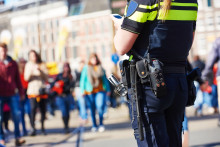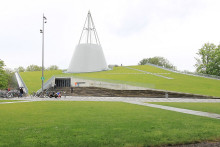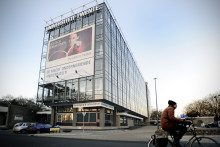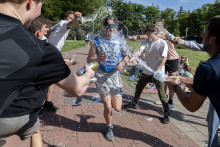According to Hülya Tek, the association's spokesperson, sixty percent of the guests were Turkish, while the remaining forty percent represented other countries, and tickets sold out on Friday afternoon before the event on Saturday.
Since its inception a few years ago, `one of the main aims of the association is to form and grow together with other nationalities,' says Erhan Bat, a PhD candidate in the Polymer Chemistry and Biomaterials group. `It's not just a closed society where all the Turkish people come together to socialize.' He was born in the southeastern part of Turkey but later moved to the coastal western region, which he said is `typical Mediterranean' and a place where there is more tolerance of other cultures and people.
His wife, Arzu Yucekaya Bat, is the current president on the board of TUSAT and a master's student in Industrial Engineering. She emphasized one of the goals of the association in her speech, `We have been trying to create and develop an interaction between Dutch and other international students and represent Turkey in the best way possible.'
At the event there was a feature performance by folk dancers, who are members of the Almelo Zeybek dance group, accompanied by musicians playing the `davul' (drums), `darbuka' (bongos) and `baglama,' a plucked string instrument. The traditional dance showed performers dressed in ornate 19th century costumes, simulating with their hands and feet, the fluid movements of a hawk. The movements of the Zeybek dance are relatively simple, but the facial expressions of dancers are important to show that they are really `tough guys' and true warriors.
A member of the association, Hamza Dogangun, explained to the audience, `The Zeybeks were mountain warriors who lived in western Anatolia and acted as protectors of the village people against landlords, bandits and tax collectors. They fought during Turkey's War of Independence.' At this time small rebellion groups were fighting against evaders. Ataturk, the founder of modern day Turkey, brought all these forces together to form a regular army.
Bálint Balogh, a master's student in Public Administration, heard of the event from one of his colleagues and was glad he attended. `I really liked the photographs in the exhibition, especially those of the mountainous regions around the black sea, which remind me of the landscapes in Transylvania, Romania,' where the castle of Dracula is situated, and the country where Balogh was born. He spent the last few years earning his first master's degree in Public Policy at the Central European University in Budapest, founded by philanthropist George Soros. `Back in Hungary, we were all internationals and socialized a lot with each other. It's different at the UT where there are less international students.'
While watching other students dance to modern Turkish music, the winner of the pub quiz, Sebastian Haanappel, commented, `I don't like dancing but obviously the Turkish really like it. I think they are more open in an emotional way, and they don't feel embarrassed to show their emotions,' but he also said international events on campus are `good for social contacts' and foster a common cultural understanding.
Contestants in the pub quiz signal their answers with red, yellow and green cards. Emre Dikmen, center, a member of TUSAT, leads contestants through a series of questions.
Feasting on Turkish cuisine (first row, left to right): Members of TUSAT, Kardelen Hatun, Aysegul Tuysuz Erman, Ozlem Durmaz Incel and Hasan Sozer serve food to Ali Telli, Selim Ciraci and Herma Draaisma.
The deep-fried Turkish dessert called `Tulumba,' literally meaning plumb, is made from unleavened dough and covered in a sweet, sugary syrup.
A table full of Turkish delicacies, including meatballs or `Izmir Kofte,' vegetarian beans, Turkish rice and bread.
Johanes Kristianto, left, at stand table next to Sezer Caynak.
Dancers from the Almelo Zevbek Folk Dance group carry in the Turkish flag while a traditional poem was being read in Turkish, opening the night's performances.















